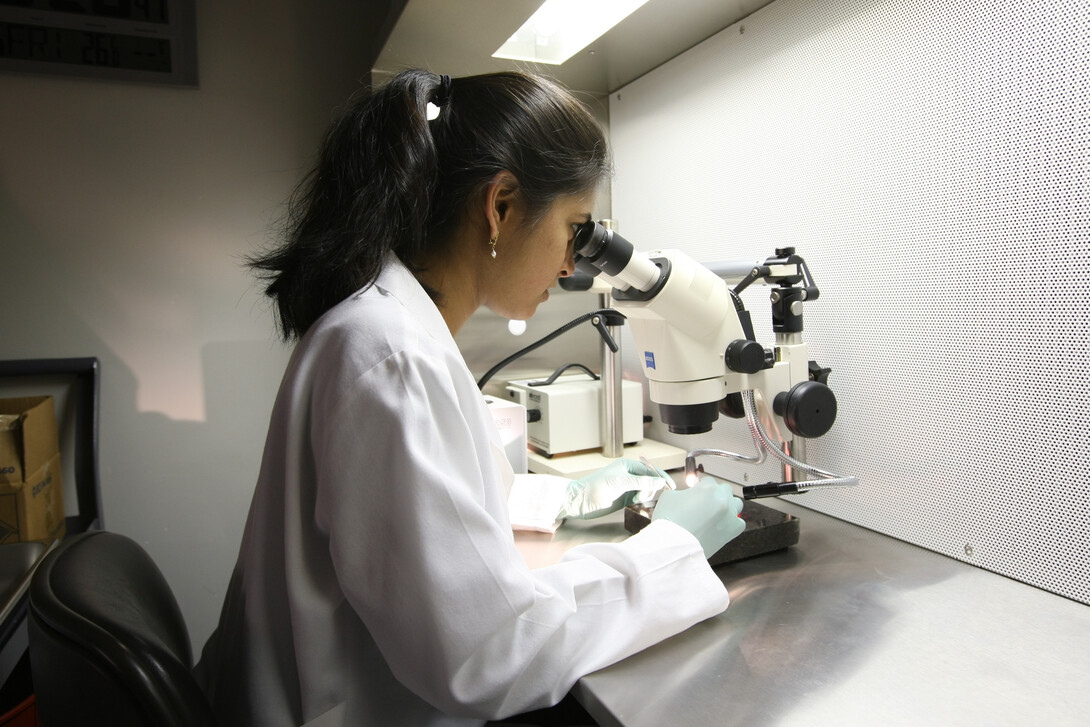Novel tissue-engineered nerve grafts offer a promising new technique to repair currently untreatable peripheral nerve and spinal cord injuries.
Media Contact: Jennifer Rizzi, Director, Communications, Penn Facilities & Real Estate Services, 215.573.6107, rizzi@upenn.edu
February 26, 2019
The University of Pennsylvania’s Division of Facilities and Real Estate Services announced today that Penn Center for Innovation spinout company Axonova Medical (Axonova) has signed a lease for a 265 square foot office and lab space within the Pennovation Center, the University’s lead facility for research and innovation. Axonova joins the list of Pennovation companies leveraging the University’s commitment to help incubate and accelerate the intersection of intellectual and entrepreneurial initiatives. Axonova is pursuing a technology that preclinical studies show can effectively recreate lost or damaged neural circuitry following neurological injury or disease—this includes currently untreatable peripheral nerve and spinal cord injuries.
Two of the company’s three business owners have particularly close ties to the University. Within Penn Medicine’s department of Neurosurgery, colleagues and co- founders Douglas H. Smith, MD, the Robert A. Groff Endowed Professor and vice chairman for research, and D. Kacy Cullen, PhD, an associate professor, specialize in neurotrauma and neural engineering research. Axonova’s President and CEO, Harry Ledebur, PhD, adds the experience of more than twenty years in biopharmaceuticals and a background in research and development, business development, intellectual property, and corporate finance. Since 2015, the trio has worked together to commercialize Axonova’s proprietary technology.
According to Smith, Cullen, and Ledebur, the crux of the challenge Axonova is attempting to solve lies in the need to restore axon connectivity to repair the nervous system. Despite the promise of various technologies in other animal studies to restore neural circuitry, the strategies have not translated to humans —there is an inability to grow axons over long, clinically relevant distances as well as guide their growth to the appropriate target tissue. However, the company has discovered two novel mechanisms that can grow and target axons over long, clinically relevant distances.
With its deep roots in the pharmaceutical and science industries and a growing biotechnology startup space, Philadelphia was a natural fit for the company headquarters. Axonova was also recently named one of seven inaugural JPOD @ Philadelphia resident companies in November, through the University’s new collaboration with Johnson & Johnson Innovation and JLABS. “Along with an innovative environment that encourages the growth and success of small businesses like ours, the strong academic background in Philadelphia offers unparalleled access to talent and new ways of thinking,” says Dr. Ledebur. “Thanks to the Pennovation Center’s affiliation with the University of Pennsylvania, the Center provides a variety of unique resources and networking opportunities for us to tap into and take advantage of. These kinds of industrially-relevant connections are critical when it comes to facilitating the translation of novel technologies.”
“Entrepreneurs drawn to the Pennovation Center join for all kinds of reasons, from access to the University network and inherently collaborative atmosphere to proximity to a major metropolitan area and highly educated workforce,” says Anne Papageorge, Vice President, Facilities & Real Estate Services at Penn. “No matter what the primary motivations, companies at Pennovation have one central aspiration in common: to take their work to the next level and offer a window into a better future. Axonova is joining a community of scientific, academic, and commercial innovators with unmatched dreams and dedication, and we are excited to welcome them.”
About The Pennovation Center
The Pennovation Center is a 58,000 square-foot three-story facility designed for start-up companies, entrepreneurs, and inventors looking to be part of a unique community of innovators, and includes a full service technology incubator; basic wet and dry laboratories; private offices, Inventor Garages, as well as a coworking space for up to 200 members, operated by 1776. It opened in October 2016 as the centerpiece of the University of Pennsylvania’s Pennovation Works, a 23-acre development adjacent to the University campus on the southern bank of the Schuylkill River providing facilities and amenities to bridge intellectual and entrepreneurial initiatives among University researchers, private sector innovators, and start-ups. Owned by the University, and operated by its Division of Facilities and Real Estate Services, Pennovation Works houses research labs from Penn’s schools of Arts & Sciences, Dental Medicine, Design, Engineering & Applied Science, and Veterinary Medicine, and companies such as Qualcomm Philadelphia Research Lab, Netronix, and Limelight Bio. Approximately 85 companies and 350 innovators are currently located at Pennovation, where ideas go to work.
Visit pennovation.upenn.edu and follow @PennovationWorks on Facebook, @PennovationWork on Twitter, @PennovationWorks on Instagram, and @PennovationWorks on LinkedIn.
